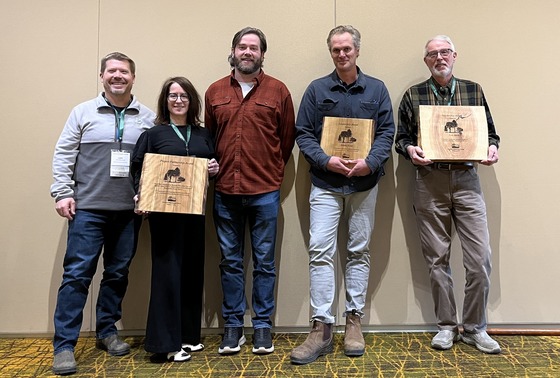Groundwater Coordinating Council Releases Annual Report
Groundwater Standards, Nitrates And PFAS Top List Of Groundwater Improvement Recommendations In Annual Report To Wisconsin’s Legislature
MADISON, Wis. – The Wisconsin Groundwater Coordinating Council today shared key recommendations for protecting and preserving vital groundwater resources in its 2022 annual report to the Wisconsin State Legislature. The recommendations focus on setting new and revised health-based groundwater standards, evaluating and addressing drinking water contamination from nitrates and perfluoroalkyl and polyfluoroalkyl (PFAS) chemicals.
“Every Wisconsinite deserves access to safe, clean drinking water, but we know that for too many communities across our state that’s not the case,” said Gov. Tony Evers. “We’ve taken important steps forward like declaring 2019 the Year of Clean Drinking Water, providing grants to help farmers mitigate nitrates, and investing $10 million to help well owners address contamination, and the Groundwater Coordinating Council’s annual report plays an important role in informing our work toward ensuring clean, safe water for folks across our state.”
The key recommendations in the report address some of the most prevalent and pressing issues in Wisconsin water quality, including:
- Setting new and revised health-based groundwater standard recommendations received from DHS;
- Protecting groundwater from nitrate and other agricultural contaminants and;
- Addressing public health and environmental concerns from perfluoroalkyl and polyfluoroalkyl (PFAS) chemicals.
Wisconsin has a long and proud history of groundwater protection. Wisconsin’s groundwater law adopted in 1983, is held up as one of the nation’s model environmental laws in part because of its robust, science-based process for protecting the quality of our groundwater and public health.
For nearly 40 years, this law has guided the process that DHS and the DNR follow, ensuring a scientifically rigorous review of available technical information and clarity on how recommended groundwater standards are selected. However, the DNR was unsuccessful in adopting revisions to groundwater standards earlier this year after several years of being prevented from revising standards.
“I am disappointed that none of the DHS recommendations for new or revised health-based groundwater standards were approved this year. It is important for the state to set standards for substances that are detected in groundwater and are shown to have a detrimental effect on human health. Adequate supplies of uncontaminated groundwater are crucial not only for the water we consume but also for our agricultural operations and breweries in Wisconsin,” said Jim Zellmer, Groundwater Coordinating Council Chair and Deputy Division Administrator for the DNR’s Environmental Management Division. “Adopting groundwater standards are key for all council member agencies in their continuing work to ensure every Wisconsinite has access to clean, safe drinking water. Clean drinking water in Wisconsin remains a public health priority for the council in 2022 and beyond.”
Perfluoroalkyl and polyfluoroalkyl (PFAS) chemicals have been detected in drinking water and groundwater throughout Wisconsin. PFAS are a group of human-made chemicals used for decades in numerous products, including non-stick cookware, fast food wrappers, stain-resistant sprays and certain types of firefighting foam. These contaminants have made their way into the environment, and humans and animals can develop negative health impacts when exposed to them.
The report highlights the challenges of removing PFAS from groundwater. The Council recommends establishing PFAS groundwater enforcement standards to guide cleanup efforts and safeguard public health, and continuing to identify PFAS sources and their potential impacts to groundwater and the environment. The Groundwater Coordinating Council also supports the Wisconsin PFAS Action Council (WisPAC) in developing and coordinating statewide PFAS initiatives.
The 2022 report also highlights the need for increased support of applied groundwater research to protect and preserve our valuable groundwater resources. Wisconsin is recognized as a national leader in groundwater research largely due to the GCC’s well–established research funding process coordinated by the GCC. Increased funding could be used to address emerging groundwater contaminant concerns such as PFAS.
More information is available on the DNR’s Wisconsin Groundwater Coordinating Council webpage.
NOTE: This press release was submitted to Urban Milwaukee and was not written by an Urban Milwaukee writer. While it is believed to be reliable, Urban Milwaukee does not guarantee its accuracy or completeness.
More about the PFAS Problem
- Gov. Evers Signs New PFAS, Lead Regulations - Danielle Kaeding - Mar 2nd, 2026
- Gov. Evers Builds Upon Efforts to Clean Up Wisconsinites Water, Approves New Rule Changes Strengthening Pfas Drinking Water Standards - Gov. Tony Evers - Mar 2nd, 2026
- PFAS Levels in Great Lakes Fish Are Dropping - Danielle Kaeding - Feb 6th, 2026
- Gov. Evers and GOP Lawmakers Near a Deal on PFAS Pollution - Danielle Kaeding - Jan 22nd, 2026
- Gov. Evers Optimistic About Reaching Final Deal With Republican Lawmakers to Secure Release of $125 Million in Long-Awaited Pfas Investments - Gov. Tony Evers - Jan 21st, 2026
- Bipartisan Push to Tell Counties Faster When Water Tests Fail - Henry Redman - Dec 19th, 2025
- MKE County: County Seeks to Sue PFAS Producers, Oil Companies - Graham Kilmer - Dec 10th, 2025
- Wisconsin Reviewing EPA-Approved Pesticides For PFAS - Danielle Kaeding - Dec 9th, 2025
- State Nears Settlement with Johnson Controls/Tyco Over PFAS Spills - Danielle Kaeding - Dec 4th, 2025
- Senate Bill Promotes Soybean-Based Firefighting Foam to Replace PFAS - Danielle Kaeding - Dec 2nd, 2025
Read more about PFAS Problem here























